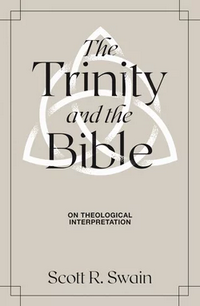 |
The Trinity and the Bible:
|

Scriptural Trinitarianism is not unformed, inchoate Trinitarianism. As the self-revelation of the Triune God through his authorized and anointed prophets and apostles, scriptural Trinitarianism is the primary discourse of Trinitarian theology: normative, fluent, and eloquent. Ecclesiastical Trinitarianism, the Trinitarian theology of the churchs sermons, hymns, confessions, and creeds, is the secondary discourse of Trinitarian theology. Ecclesiastical Trinitarianism, at its best, is the attempt to represent the “grammar” of Scripture’s primary Trinitarian discourse in new settings and on new occasions, not to refine or develop what would otherwise be unrefined and undeveloped without it but to promote the church’s greater fluency in reading Scripture’s primary Trinitarian discourse and in responding to that discourse in its own eloquent expressions of prayer, proclamation, and praise of the Triune God.
What’s The Trinity and the Bible About?
I’m going to keep this short, because I’m sure that if I try to really get into the material, I’m only going to show how ill-equipped I am to discuss it in a meaningful fashion.
Rather than one overarching topic, this is a collection of papers that seek to show both how the Bible reveals the Trinity and how the Trinity shapes our reading of the Bible.
Swain describes the book in his introductory chapter:
Some of [the chapters] began as formal academic lectures; all of them have been published previously in various books and journals, The first and second chapters address the broader hermeneutical framework of Trinitarian biblical exegesis as well as the reception of one particular instance of such exegesis in North American Reformed and evangelical theology. The final three chapters address different aspects of Trinitarian theology by means of exegetical attention to different forms of New Testament literature, including Gospel, Epistle, and apocalyptic.
The Table of Contents, to match up with Swain’s description, is:
1. (Re)turning to the Subject: Trinity and Biblical Interpretation
2. The Bible and the Trinity in Recent Thought: Review, Analysis, and Constructive Proposal
3. B. B. Warfield and the Biblical Doctrine of the Trinity: A Historical Experiment
4. God’s Lordly Son: Mark 12:35–37 and Trinitarian Christology
5. Heirs through God: Galatians 4:4–7 and the Doctrine of the Trinity
6. To Him Who Sits on the Throne and to the Lamb: Hymning God’s Triune Name in Revelation 4–5
7. Seven Axioms: On the Trinity, the Bible, and Theological Interpretation
So, what did I think about The Trinity and the Bible?
Theological interpretation of Scripture prepares us for the vision of the Triune God by cultivating our capacities for spiritual perception and by attuning our affections to the intelligible and adorable good that the Triune God is. But theological interpretation of Scripture is more than mere preparation for this happy vision. Like the Israelite spies who tasted the grapes of Eschol before entering the Promised Land, theological interpretation of Scripture enables us to participate in this happy vision in advance by helping us perceive traces of God’s Triune glory in God’s good creation and by serving faith’s grasp of God’s Triune glory in the mediate adumbrations and attestations of that glory in the prophetic and apostolic scriptures (2 Cor 4:6).
This is not an easy read, even at 131 pages, it took several hours for me to get through it (honestly, after reading the first chapter, I wondered if I should limit myself to one chapter a week).
But it was worth the effort, every bit of it. Like a lot of the more scholarly theological books I read, I was reminded frequently while reading that I’m not an academic and this is above my weight class. But it wasn’t inaccessible, just difficult and required a little commitment.
But like the best academic theology, there were moments of the most doxological writing—or doxology-inspiring writing (or a mix). There are paragraphs and paragraphs that I wish I could commit to memory, so I could use them at the drop of my hat in conversation and in prayer.
The “Seven Axioms: On the Trinity, the Bible, and Theological Interpretation” (Chapter 7), in particular, are the kinds of things that everyone needs to learn and I think I’m going to read a few times over the next few weeks/months and really internalize.
I strongly recommend this to anyone who wants to solidify their understanding of the Trinity and wrestle with Scriptural texts, theology, and history for that.

This post contains an affiliate link. If you purchase from it, I will get a small commission at no additional cost to you. As always, opinions are my own.
![]()



1 Pingback